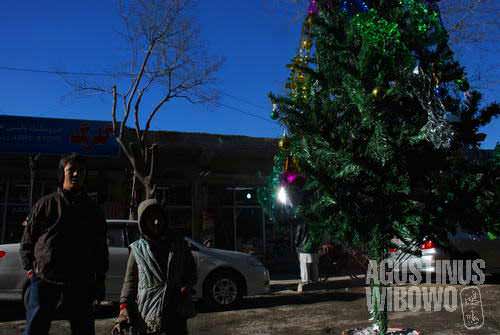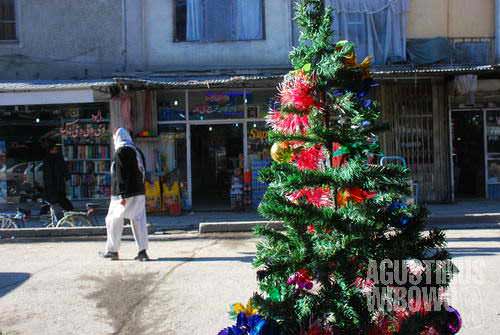Kabul – Christmas in Kabul

Christmas trees in Kabul streets, who expected?
In devout, conservative Islamic Republic of Afghanistan, Christmas is just like another day. It’s an ordinary day when people go to office, children go to school, and nobody is aware of what Christmas is. But since last some few years, the Christmas trees start to decorate the Kabul again.
It is in the Flower Street, across the rows of foreigner-oriented souvenir shops of Chicken Street, where most flower shops in Kabul are located. Christmas trees, considered as variation of flowers, along with Christmas accessories like stars, Santa Claus, colorful ribbons, et cetera, are offered in the roadside of the narrow alley.
It is indeed a bizarre combination between the artificial Christmas trees, mostly imported and costs around US$25, with women clad in blue burqas passing by.
Under Taliban, said Muhammad, a shop owner, selling Christmas trees was totally prohibited. But he claimed that the Christmas trees were already available in Flower Street shops long before the Taliban. Nowadays, as the country is flooded by thousands of expatriates, the market is back again. These foreigners are the main consumers of anything related to the Christian festivities. How can a Christmas celebration be without a Christmas tree?
December 20th until 25th are the high-season for the Christmas tree market in the Flower Street. “It is not only foreigners who buy the trees,” said the shop owner, “but also the Afghans. They don’t celebrate Christmas but they do buy these trees as gift to their foreigner friends.”
United Nations declared the Christmas Day as holidays for their missions in Afghanistan. There are also dozens of International NGOs in the capital, all with expatriates who still regard Christmas as big deal. But the only way to celebrate Christmas in the conservative Islamic republic, where conversion of locals to Christianity is illegal, is only by doing quietly in their private houses, foreigner-only restaurants, guest houses, and military barracks. Besides the Christmas accessories offered in Flower Street, there are no other visible signs of Christmas anywhere else in the capital’s streets.

A big Christmas tree in Chicken Street
Some days ago, I have received a phone interview from BBC Indonesia in London asking for my experience of celebrating Christmas in Muslim countries in South and Central Asia. As this is my first Christmas in Afghanistan, I had not much to say. But the last year Christmas in Uzbekistan, I celebrated Eid-ul-Qurban with a devout Muslim family in Bukhara. I was invited to their house, which was not only the site of slaughtering of the sheep for sacrifice (Eid-ul-Qurban is Muslim festival of sacrifice), but was also decorated with big Christmas trees and Santa Claus dolls. For the Uzbek Muslim, the Christmas trees were not at all Christian symbol, but a must ornament to welcome the New Year.
Here in Kabul, where public electricity only touches the city center area and only goes until 10 a.m., since yesterday has had the blessing of the whole-night electricity – a government habit for the sake of the people who celebrate Eid festivals. I wondered whether Christmas was considered a festival here, that the government decided to provide whole-night electricity. Or maybe it was just a lucky blessing?
Year 2008 is coming soon as well. But just like the Christmas, the Christian New Year also means nothing here. There will be no holiday, no celebration, and even the Indonesian Embassy will be quiet as most Indonesian expatriates in Kabul already left home for holiday season.
Anyway, from the freezing Kabul, I wish you a merry Christmas.






Leave a comment